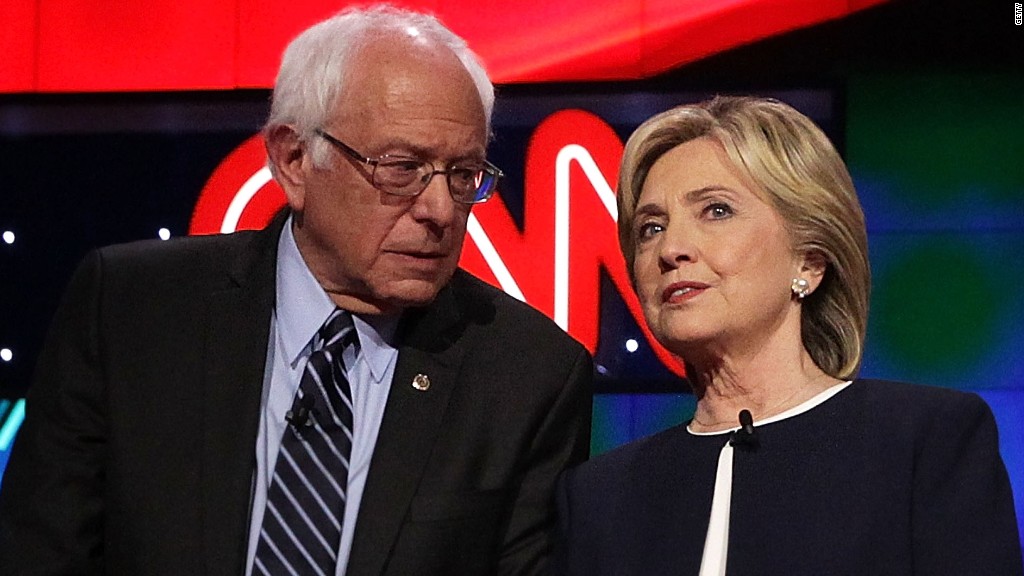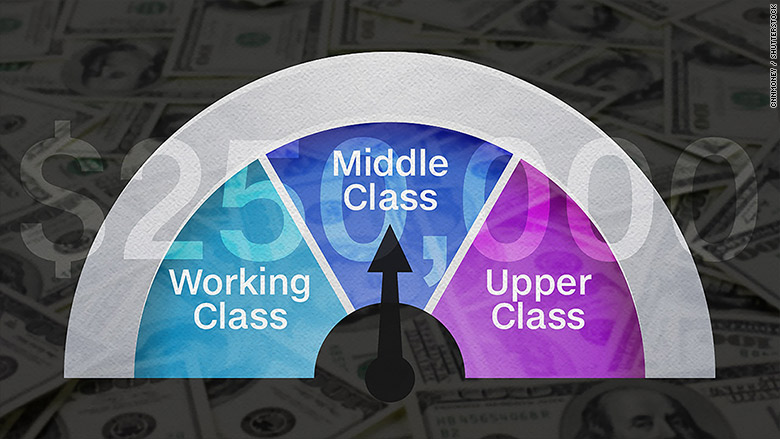
Just who qualifies as middle class has always been tough to pin down.
For Hillary Clinton and Bernie Sanders, the middle class extends to those earning up to $250,000 a year. Both have used that figure as the dividing line, raising taxes on those with higher incomes as part of their campaigns to ensure the wealthy pay their fair share.
But a deeper look into Americans' income data shows that threshold would let many well-off Americans off the hook.
Those with incomes of $250,000 a year are in the top tier of the nation's earners. A household income of $206,600 was enough to get into the Top 5% in 2014, according the latest U.S. Census Bureau statistics.
The typical middle class American family, meanwhile, made about $53,700 a year.
While there's no set definition for middle class, the Pew Research Center says it encompasses those making two-thirds to two times median income for one's household size. That means a middle class family of three would earn between $42,000 and $126,000 a year.

Related: What is middle class, anyway?
Setting the bar between middle class and wealthy at $250,000 isn't a new idea. Former President Bill Clinton cited that figure when he campaigned on raising taxes on the wealthy in 1992, said Martin Sullivan, chief economist with Tax Analysts. After he was elected, Clinton instituted a new top tax bracket for those earning more than $250,000.
In their 2008 campaigns for the Democratic nomination, Hillary Clinton and Barack Obama both promised to hike taxes on the wealthy, whom they defined as earning more than $250,000. Obama then used this threshold for several of his tax changes. In the 2012 fiscal cliff deal with Congress, however, he agreed to raise the bar to $450,000 when it came to increasing income and capital gains rates on the rich.
Still, $250,000 is an arbitrary number, Sullivan said. While it doesn't reflect the American middle class, Washington politicians and lobbyists use it because they are surrounded by people with higher incomes.
"$250,000 has become enshrined, but it's not based on an economic study," he said. "It's a number people have become comfortable with."
Related: Taxing the Rich: The record under Obama
Not raising taxes on the middle class -- which she is a centerpiece of Hillary Clinton's campaign. She pledged at the Democratic debate in December not to hike taxes on the middle class, noting that she made the same guarantee when she ran in 2008.
To pay for her spending plans -- including making college more affordable and guaranteeing paid family leave -- she would target the wealthy. For instance, she'd institute the so-called Buffett Rule, which requires those making more than $1 million to pay an effective tax rate of at least 30%. She'd also hike the estate tax, raise taxes on investment managers and impose a 4% surcharge on income over $5 million. She has yet to unveil a complete tax plan.
She has also lashed out at her rival for the Democratic nomination, saying part of Sanders' plan calls for hiking taxes on everyone.
Related: How taxes would be much higher under President Bernie Sanders
"I am convinced that raising incomes for hardworking families is the number one job of our economy. That's why I believe you deserve a raise increase, not a tax increase, and I am not going to stand for that," she said on the campaign trail last fall.
Sanders, whose campaign revolves around reducing income inequality, would mainly boost taxes on the wealthy, but he would also raise levies more broadly to pay for his universal health care and family leave proposals.
But Sanders also draws the line at $250,000, limiting several of his tax increases to those making more than $250,000. The Vermont senator would slap higher income and investment tax rates on taxpayers earning more than $250,000, as well as impose an additional payroll tax on wages above that amount to shore up Social Security.


